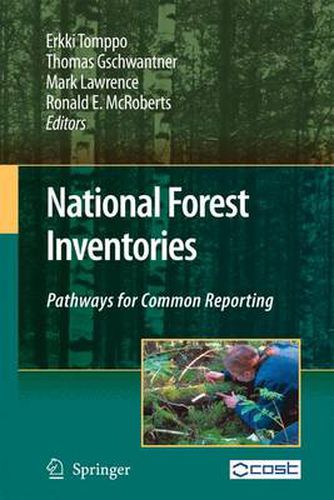Readings Newsletter
Become a Readings Member to make your shopping experience even easier.
Sign in or sign up for free!
You’re not far away from qualifying for FREE standard shipping within Australia
You’ve qualified for FREE standard shipping within Australia
The cart is loading…






This title is printed to order. This book may have been self-published. If so, we cannot guarantee the quality of the content. In the main most books will have gone through the editing process however some may not. We therefore suggest that you be aware of this before ordering this book. If in doubt check either the author or publisher’s details as we are unable to accept any returns unless they are faulty. Please contact us if you have any questions.
Forest inventories throughout the world have evolved gradually over time. The content as well as the concepts and de?nitions employed are constantly adapted to the users’ needs. Advanced inventory systems have been established in many countries within Europe, as well as outside Europe, as a result of development work spanning several decades, in some cases more than 100 years. With continuously increasing international agreements and commitments, the need for information has also grown drastically, and reporting requests have become more frequent and the content of the reports wider. Some of the agreements made at the international level have direct impacts on national economies and international decisions, e. g. , the Kyoto Protocol. Thus it is of utmost importance that the forest information supplied is collected and analysed using sound scienti?c principles and that the information from different countries is comparable. European National Forest Inventory (NFI) teams gathered in Vienna in 2003 to discuss the new challenges and the measures needed to get data users to take full advantage of existing NFIs. As a result, the European National Forest Inventory Network (ENFIN), a network of NFIs, was established. The ENFIN members decided to apply for funding for meetings and collaborative activities. COST- European Cooperation in Science and Technology - provided the necessary ?n- cial means for the realization of the program.
$9.00 standard shipping within Australia
FREE standard shipping within Australia for orders over $100.00
Express & International shipping calculated at checkout
This title is printed to order. This book may have been self-published. If so, we cannot guarantee the quality of the content. In the main most books will have gone through the editing process however some may not. We therefore suggest that you be aware of this before ordering this book. If in doubt check either the author or publisher’s details as we are unable to accept any returns unless they are faulty. Please contact us if you have any questions.
Forest inventories throughout the world have evolved gradually over time. The content as well as the concepts and de?nitions employed are constantly adapted to the users’ needs. Advanced inventory systems have been established in many countries within Europe, as well as outside Europe, as a result of development work spanning several decades, in some cases more than 100 years. With continuously increasing international agreements and commitments, the need for information has also grown drastically, and reporting requests have become more frequent and the content of the reports wider. Some of the agreements made at the international level have direct impacts on national economies and international decisions, e. g. , the Kyoto Protocol. Thus it is of utmost importance that the forest information supplied is collected and analysed using sound scienti?c principles and that the information from different countries is comparable. European National Forest Inventory (NFI) teams gathered in Vienna in 2003 to discuss the new challenges and the measures needed to get data users to take full advantage of existing NFIs. As a result, the European National Forest Inventory Network (ENFIN), a network of NFIs, was established. The ENFIN members decided to apply for funding for meetings and collaborative activities. COST- European Cooperation in Science and Technology - provided the necessary ?n- cial means for the realization of the program.